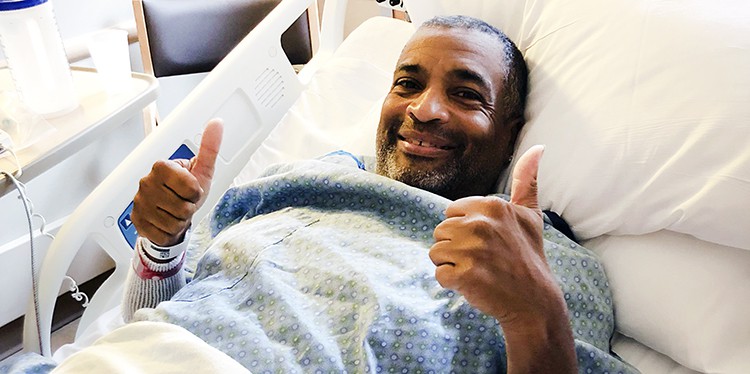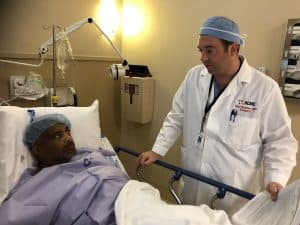Free from dialysis thanks to kidney that needed a little TLC

On Friday, July 26, 2019, Hennepin Healthcare surgeon Dr. Paul Stahler transplanted a hepatitis C-infected kidney into a patient with kidney failure. This new life-saving – and life-changing – protocol of allowing the use of kidneys from hepatitis C-infected donors helps make a transplant possible for more patients like CJ Dabney, who was fully aware of the risks and actually encouraged the procedure.

Dabney and transplant surgeon Dr. Paul Stahler discuss the procedure before going into the operating room.
“I did a lot of research and asked a lot of questions,” he said. “I’m confident that if this type of transplant was available earlier, I would have made the same decision.”
In Minnesota, the wait time for a deceased donor kidney is anywhere from 5 to 7 years. Sadly, because many patients are on the waiting list too long, they become too sick to undergo a kidney transplant or die. This is what happened to one of Dabney’s friends he met at dialysis, who jokingly coveted his “choice” spot where the two spent many hours each week receiving treatment.
“He used to tell me, ‘I know you’re going to get a kidney – and then I’m taking your dialysis chair!’” Dabney recalled. “I’m so sad he didn’t live to see me get this, but somehow he knows – and he was there, too.”
With the large spike in opioid overdoses, there has been a rise in the incidence of hepatitis C, which was once very difficult to treat because the medications were not very effective.
“Within the last 5 years, new medications have come to market which have essentially made hepatitis C curable,” explains Hennepin Healthcare nephrologist Dr. Jeffrey Wang. “Because of this, the transplant community has started to transplant organs from donors with hepatitis C into recipients without hepatitis C.”
Numerous other centers in the United States have shown this to be safe for the recipients. They are treated for hepatitis C post-transplant and are effectively able to clear the infection. It decreases the time patients need to wait to receive one of these organs – from weeks to months versus years – and the quality of the organs they receive is superior to the average deceased donor kidney because they are coming from younger, overall healthier donors.
“It seems like his energy has changed and it’s so nice to have him back,” Dabney’s son, Josh said at his father’s post-operative visit on July 30.
Now that he’s free from being tied down to dialysis Dabney wants to use that energy to enjoy life, do more walking (he already walks 3-5 miles each day), and advocate for others with kidney failure so they can learn about the options available to them.
“If you get a diagnosis of kidney failure it’s not the end. There’s always hope. You have to have a positive attitude and listen to your health care team – be compliant with your therapy!” he said.
His story was covered by Jeremy Olson in the Star Tribune on Wednesday, July 30.
The first kidney transplant was performed at Hennepin Healthcare in 1963, making it the first program established in Minnesota and the upper Midwest. Hennepin Healthcare was one of the first long-term dialysis programs in the country and has been a consistent leader in transplantation research including the development of machines allowing storage and transport of donor kidneys. The physicians, nurses, pharmacists, and scientists at Hennepin Healthcare’s Transplant Program consistently present and publish research to the transplant community. The Scientific Registry of Transplant Recipients (SRTR) – the national database of all transplant patients in the US – is located within Hennepin Healthcare.
The program was also one of the first centers in the country to perform laparoscopic donor nephrectomies in the early 1990s making recovery from kidney donation easier for patients, and was an early adopter of donation after cardiac death in the early 2000s increasing the opportunities for donation and number of organs available for transplant.
For more information go to www.hennepinhealthcare.org/transplant.
2 Comments
Leave a Comment
You must be logged in to post a comment.


I am so grateful my son has a new life and many thanks to everyone on the medical team that has helped him friends and family
As I read through this insightful blog post, my heart goes out to all those who have experienced or are currently battling kidney problems. It is indeed a silent struggle, one that often goes unnoticed or is misunderstood by many.
Kidney problems encompass a wide range of conditions, from kidney stones and infections to chronic kidney disease and kidney failure. Each of these ailments brings its own set of challenges, affecting not only the physical well-being but also the emotional and mental health of the individuals affected.
To all those who are personally experiencing kidney problems or have loved ones facing these challenges, remember that you are not alone. There is a vast community of support and resources available to help you on this journey. Keep seeking knowledge, stay proactive in your healthcare clinic , and lean on those around you for strength.
Let us come together as a society to support research, raise awareness, and provide compassion for individuals battling kidney problems. Together, we can make a difference in their lives and pave the way for better kidney health in the future.
Stay strong, stay hopeful, and keep fighting!